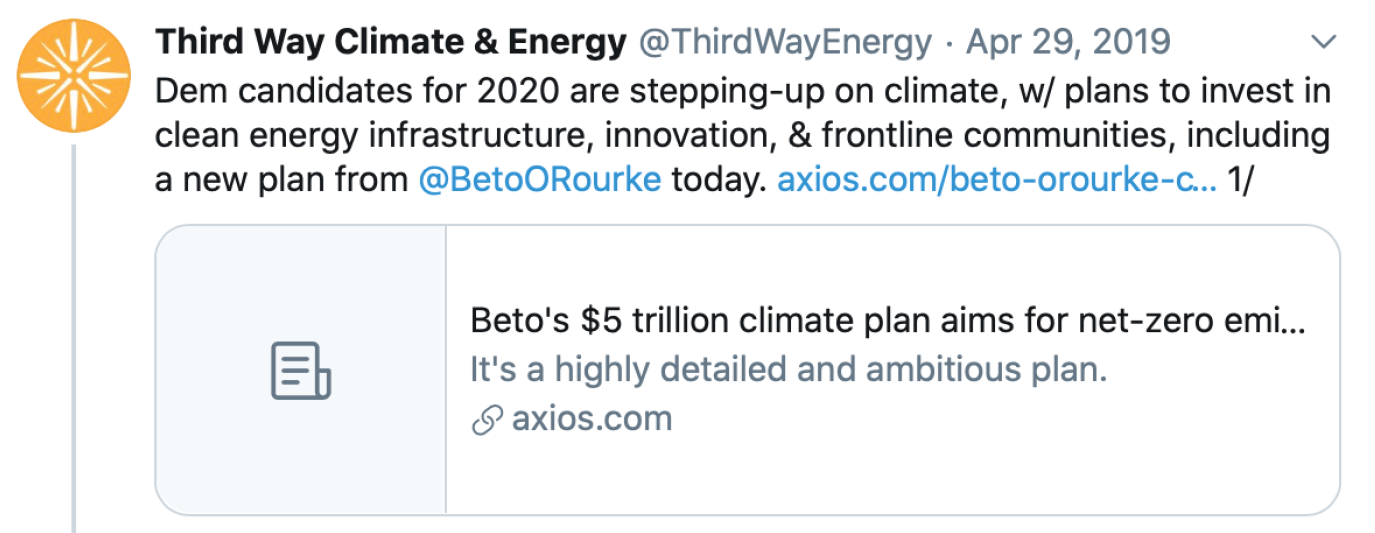Climate & Energy Communications Cheat Sheet 5/3/19

Congress is back in session this week, and Democrats aren’t wasting a minute - there were climate-related hearings in both chambers, the House passed a bill on US climate commitments, and two presidential candidates unveiled climate plans that are among the most detailed policy platforms we’ve seen so far in the 2020 race.
Fighting climate change is one of the greatest challenges America has ever faced. But with Democrats (and a few Republicans) driving more focus to the issue, and so many members committing to ambitious and thoughtful policy approaches, it’s a bit easier to see the light at the end of the tunnel.
Climate Action Now
We were happy to hear the news of the passage of H.R. 9 (Climate Action Now Act) in the House yesterday, which compels the Trump Administration to remain in the Paris Climate Agreement and forces the Administration to develop a plan that meets targets set by the accords.
While the full memo on our recent climate polling is coming soon, I'll tell you that re-committing to the Paris Agreement is WILDLY popular among Democratic voters--more favorable than any other single component of a climate plan. So making this a priority is a smart move both practically and politically.
Climate & Clean Energy Hearings
Last month, a bipartisan group led by Sen. Murkowski and Sen. Booker introduced the Nuclear Energy Leadership Act, which provides a comprehensive blueprint for bolstering the next-generation of America’s largest source of reliable and carbon-free power. The Senate Energy and Natural Resources Committee discussed the bill on Tuesday, hearing testimony from experts on innovation, workforce, industry, regulatory issues. Mark McManus from the AFL-CIO reminded the body about the climate and economic benefits of developing the next generation of nuclear: “New nuclear generates well-paying clean energy jobs Americans have been waiting for. Nuclear energy has the potential to improve our energy security, reduce our CO2 footprint and deliver enormous benefits to the U.S.”
Also on Tuesday, the House Select Committee on the Climate Crisis held their second hearing, focusing on drawing down carbon and building up the American economy. Chairwoman Castor opened the session by reminding members that Congress was first told of the threat of climate change back in 1988, but failed to take action. Now 30 years later, with the impacts of climate change already upon us, we can no longer afford inaction.
Talking points and major takeaways from the Select Committee Hearing
- It was encouraging to see some Republican members acknowledge the threat and scientific consensus on climate, though there was sharp disagreement on the policy mechanisms needed to achieve economy-wide decarbonization. The few members who questioned climate science were fish out of water, which quite frankly was terrific to watch.
- Testimonies from climate and energy experts highlighted the need for technology-inclusive policies to address climate change, as well as investments in innovation across many types of clean energy technologies.
- Hal Harvey, the CEO of Energy Innovation and former energy advisor to Presidents George H.W. Bush and Bill Clinton, said that an investment in innovation would render a massive return: "A trebling of federal clean energy R&D of $2.5 to 7.5 billion could create an amazing down payment...and in the process, you would drive the price down as you've seen with solar."
- We were happy to hear Diana Liverman, one of the scientists who contributed to October’s IPCC report, bring up carbon capture technologies. The report makes clear these will be necessary to cut emissions and remove carbon that’s already in the air. Check out our map of projects here.
- Liverman reminded Rep. Palmer that scaled up mitigation efforts are as important in addressing the crisis as was adaptation, as pointed out in the last National Climate Assessment report.
More Democratic Candidates Release Plans
More Democratic presidential candidates are making climate a top priority in the election, including former Texas Representative Beto O’Rourke who released a bold and aggressive science-driven plan on Monday, and Gov. Jay Inslee who released his detailed energy and climate plan today.
Each candidate has some distinct ideas on exactly how to get the job done, but both of their plans pass the most critical test: they’re designed to make sure we get to zero emissions by 2050 at the latest. We’re excited to see detailed plans that are ambitious, driven by science, and seek to clean up the messes created by the Trump Administration on Day One. If you ask us, EVERY candidate needs one.
Check out our recent Twitter thread on Beto’s plan, and follow @ThirdWayEnergy for our take on the Inslee plan and other candidates’ plans emerge.


Subscribe
Get updates whenever new content is added. We'll never share your email with anyone.

